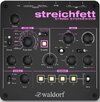Uli mit der nächsten Absichtserklärung auf GS.
„Dear all,
As many of you know, synths have been my passion for the past 40 years. Sometime ago I have set the goal for Behringer to bring back some of the loved analog synth jewels from the past.
Please allow me to share some thoughts with you and apologies if this is a longer thread.
Does this make any commercial sense?
Every company has to earn money in order to survive, and so do we. However, since we are privately owned, we don’t really care about the next quarter’s result or "shareholder value" since it is our philosophy to reinvest everything we earn.
This gives us the tremendous freedom to work on projects that can only be described as “labor of love” as they might not yield any financial gains. This is why we embark on these synth projects; some of them might not sell in high quantities and frankly to us it doesn’t really matter.
Many of our competitors spend all of their effort on marketing to make you believe in analog synth emulation simply because it’s much easier and cheaper to assemble a DSP chip on a PCB board rather than building products with thousands of analog components and deal with the manufacturing complexity plus expensive manual calibration processes.
However we at Behringer and Midas believe in the passion to revive these analog jewels and the fun these projects create for our team - which to us is worth everything.
Why we believe in analog?
We at Behringer do not believe in “virtual analog”, VST’s or other creative names for digital sound emulations as we are of the firm opinion that you cannot replicate true analog sound through digital technology, and there are many technical reasons for this. To be very clear, this doesn’t mean digital synths or VST’s can't sound great, but it is just something we don’t believe in.
Our passion and emotions are with true analog synths and our goal is to bring back the authentic sound of original designs from the period of the 60’s to the 80’s. In order to achieve the exact same sound, we will use the same circuitry and where possible the same components, however we will apply modern manufacturing technologies to make these instruments affordable, mass producible and reliable for the long-term use.
In many cases we will also remanufacture obsolete components if we feel they are relevant to the sound. In short we will not spare any effort in order to capture the spirit of these synths as it is all about authenticity.
Why do we make this announcement?
For the first time in our 30 year history, we have decided to completely open up our company and share every step of the development process with you so you can ask questions while we will be seeking your opinions.
In fact we want you to participate in this end-to-end process so we can learn from you, but also for you to fully understand how such a synth is developed and manufactured.
What is the UB-Xa synthesizer?
Over the past years we have done a lot of research both on forums but also through interviews with professional musicians in order to understand what the most sought after synths and drum machines are, but also what people feel the sound signatures of these synths are and why people feel so strongly about them.
When it comes to poly-synths the overwhelming request is a rebirth of the
Oberheim OB-Xa.
Today I officially announce that we have decided that we will develop and produce an authentic
OB-Xa clone which we call the UB-Xa. As you can imagine, this is a very complex and time-consuming project and at this stage we won’t be able to tell you when the instrument will be available in the market or what it will cost.
Since this is more a labor of love than a commercially viable project, our engineers can’t work fulltime on this synth and will use some of their free time, hence the project will likely take more than 12 months.
Most importantly, our goal is to make it an absolute authentic sounding instrument and offer it at a truly affordable price - but you know this already
.
Because of its high complexity, we have assigned this project to our most experienced team which is the Midas team in Manchester, UK. These synth nuts and super-smart engineers - under the leadership of Pete and Rob - were also the ones who developed the successful DeepMind12.
So what’s next?
In around one week from now, Pete and Rob will post our first video and share some thoughts with you. Our intention is to not only post videos on a regular basis but also write articles and publish them on our social media pages so you can follow this project.
Now that we have decided on the project, next is the discussion around the basic concept, the feature set and also the building blocks including potential component choices. In the near future we will be able to show you the first “bread boards” of the sound engine and hopefully let you hear some sound samples.
Next will be PCB and mechanical designs, followed by hand- and tool made samples. And then of course we will be sharing the exciting mass production where we will be showing the production setup and testing plus quality control processes. And if you’re not yet bored by then, we can also show you the packaging and shipping process.
The team in Manchester and I are very excited about this project and we hope that many of you will chime in and participate.
And one more thing - once we’re nearing shipping, we will be raffling off some free units among you as a token of appreciation.
May the fun begin☺
Uli“








